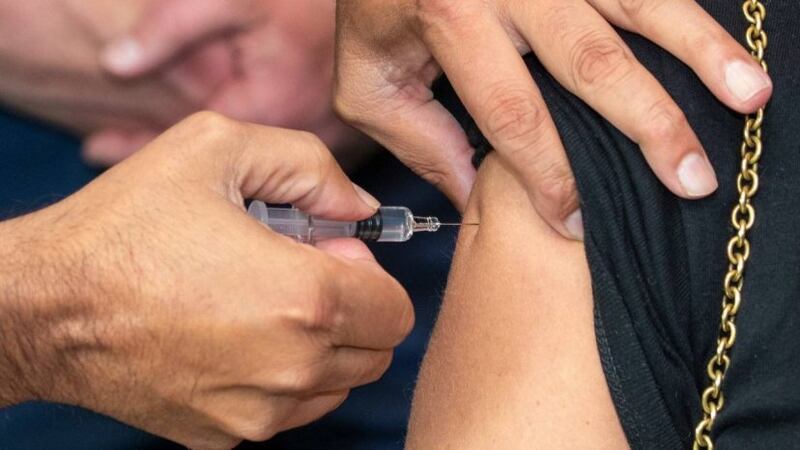A court has ordered that a teen must be vaccinated against Covid-19. Photo / Mark Mitchell
A 14-year-old girl with severe disabilities has been vaccinated against Covid-19 despite her mother's protests.
The welfare and best interests of the New Plymouth teen, who is under the care of Oranga Tamariki, demanded that she be vaccinated, the Family Court ruled.
But her mother strongly opposed the order and raised a slew of her own concerns including that the vaccination "is not scientifically safe".
Her other concerns included a possible allergic reaction to the vaccine causing respiratory problems and a family history of adverse reaction to vaccination.
While Judge Dugald Matheson ruled in favour of Oranga Tamariki over the vaccination, on a separate issue he granted the mother's application for a review of a court-ordered care plan for the girl.
The recently published decision sets out the background to the case, which concerns a teen who is neurologically compromised and is particularly susceptible to respiratory infection.
She has been under the care of Oranga Tamariki since 2013 and for the most part has been with a caregiver who the court found has attended to her needs with "diligence and love".
The teen, who legally cannot be named, has significant medical needs that have required considerable assistance from medical professionals and for the past decade that has included care from Taranaki-based paediatricians.
In 2020, her paediatricians sought and obtained an order from the court for a care plan that allowed a palliative, non-invasive response to be adopted if her health deteriorated to a point that her quality of life was significantly compromised.
Her mother, who was given notice of the application but did not respond, subsequently indicated that she was aggrieved by that determination and sought a review.
The court allowed her to be heard and during that process Oranga Tamariki requested to have the girl vaccinated against Covid-19 because of concerns for her wellbeing if she was not.
The request was accompanied by a letter signed by two paediatricians with knowledge of the teen's situation. It said that because of her deteriorating breathing and airway problems, she was considered extremely high risk if she was to get Covid.
At the hearing, the mother, who is described in the decision as having some mental health frailties, expressed clear views in opposition to the overall long-term care plan, and to the vaccination proposal.
A second opinion provided by a doctor regarding the care plan and the paediatricians' recommendation for vaccination was discussed at length, "notwithstanding repeated interjections and over-talking" by the mother, the decision said.
The woman was given a further 72 hours to file any written material she wished and within that time Judge Matheson received from her 51 pages of handwritten submissions.
"What is evident from that material is her sincerely held view that since the birth of the daughter, she and her daughter have been the subject of cross-agency negligence
and conspiracy," he said in the decision.
"She repeats firmly her views as to medical negligence since the child's birth and that that negligence has been ratified by social work and legal system complicity that has denied to her daughter her rights as a person and has denied to her, her rights as a mother."
The woman was adamant that the care plans, approved by the court, were "tantamount to approval for an unlawful killing".
But she provided no independent material to support her position, the decision said.
Judge Matheson ruled that given the "intensity" of the mother's view and the limited nature of the earlier hearing, it was in the interests of natural justice that the application to review the care plan should be developed at a full hearing.
He directed that one and a half days be allocated for it.
But the vaccination issue was much more pressing, he said.
In considering the teen's circumstances, he took into account the principles relating to a child's welfare and best interests identified in the Care of Children Act 2004.
He also noted that while the girl was not in a position to express any views because of her disabilities, her lawyer supported vaccination.
After considering the doctors' evidence, which included one of them stating "he would not be recommending the vaccination unless he truly believed, hand on heart, that this is for the benefit of [the teen]", Judge Matheson directed Oranga Tamariki to arrange to have her vaccinated.
"While wishing to be respectful to [the] mother's views the issue here is the welfare and the best interests of the child, and the evidence is clear that the welfare and best interests of this child demand that she be vaccinated."


